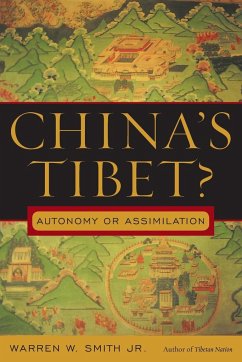This groundbreaking book explores China's efforts to assimilate Tibet, in the process rewriting Tibetan history to conform to Beijing's goals. Warren W. Smith Jr. provides the historical context for understanding the current situation through an overview of China's actual-as opposed to its promised-policies toward Tibet over time. His clear-eyed appraisal of Chinese policy convincingly shows that the PRC's ultimate intention is assimilation rather than autonomy. The author argues that Beijing fears that any genuine autonomy or dialogue with the Dalai Lama will fuel renewed nationalism in "China's Tibet," as the Chinese leadership calls its possession. The book highlights China's past and current propaganda on Tibet to demonstrate China's sensitivity and defensiveness regarding the legitimacy of its rule. It traces the history of Sino-Tibetan dialogue to show how China has tried to use it to defuse Tibetan exile and international criticism, while making no concessions in regard to Tibetan autonomy. In the absence of any solution, Smith advocates the promotion of Tibet's right to self-determination as the most viable strategy for sustaining international attention and maintaining the most essential elements of Tibetan national identity. Smith's thoroughly informed work will be valuable not only to Tibet experts and students, but also to the larger world of Tibet activists, sympathizers, and others attempting to understand China's policies.
Hinweis: Dieser Artikel kann nur an eine deutsche Lieferadresse ausgeliefert werden.
Hinweis: Dieser Artikel kann nur an eine deutsche Lieferadresse ausgeliefert werden.









